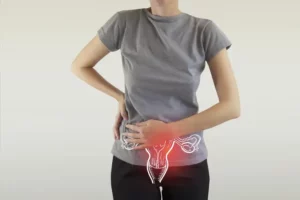Bloating, a common yet often overlooked symptom, can become particularly pronounced during menopause. This article aims to shed light on the causes behind bloating during menopause and provide insights into effective treatment options for finding relief.
Contents
What Is Menopause Bloating?
Menopause bloating refers to the uncomfortable sensation of fullness and distention in the abdominal area experienced by women going through menopause. This bloating is primarily linked to hormonal changes, specifically the decrease in estrogen levels, which plays a pivotal role in regulating various bodily functions, including fluid balance.
What are the Causes Behind it?
 Menopause bloating is typically a result of water or gas retention. The intricate interplay of various factors, primarily hormonal changes and shifts in the gut microbiome, contributes to this uncomfortable symptom.
Menopause bloating is typically a result of water or gas retention. The intricate interplay of various factors, primarily hormonal changes and shifts in the gut microbiome, contributes to this uncomfortable symptom.
Hormonal Changes
Bloating during menopause can be due to hormonal changes, specifically drops in levels of estrogen. Estrogen, a key hormone in regulating fluid balance, experiences a significant decline during menopause. This reduction can lead to water retention, manifesting as bloating.
Shifts in the Gut Microbiome
The gut microbiome, a complex ecosystem of microorganisms in the digestive tract, changes during menopause. These changes can influence the production of gases in the gut, contributing to bloating. The delicate balance of microorganisms may be disrupted, impacting digestive processes.
Other Causes
Unfortunately, estrogen is not the sole cause of menopause-related bloating. Several factors related to changes in the gastrointestinal tract can contribute to this discomfort. These include:
- Changes in Diet or Appetite: Menopausal women often experience alterations in dietary preferences or appetite. Consumption of certain foods that produce gas can contribute to bloating.
- Slowed Digestion: Metabolic shifts during menopause can lead to slowed digestion. This delay in the processing of food can result in the accumulation of gas and bloating.
- Stress Related to Menopause: The stress associated with hormonal changes and the broader life transition of menopause can impact the gastrointestinal tract. Stress-induced changes may contribute to bloating.
- Swallowing Air: Habits such as swallowing air, especially during meals, can introduce excess air into the digestive system, leading to bloating.
- Other Health Conditions: Underlying health conditions, unrelated to menopause, can also contribute to bloating. Conditions such as irritable bowel syndrome (IBS) or inflammatory bowel disease (IBD) may become more prominent during this life phase.
Any combination of the above factors may lead to bloating due to excessive gas, creating a complex interplay of causes that requires a multifaceted approach to address effectively.
Understanding the diverse origins of menopause-related bloating empowers women to make informed choices in managing and seeking relief from this challenging symptom.
What Menopause Belly Looks Like: Symptoms To Watch Out!
 Bloating during menopause is a complex and multifaceted symptom that can manifest in various ways. Recognizing the symptoms associated with menopausal bloating is crucial for timely intervention and effective management. The following signs may signal the presence of menopausal bloating:
Bloating during menopause is a complex and multifaceted symptom that can manifest in various ways. Recognizing the symptoms associated with menopausal bloating is crucial for timely intervention and effective management. The following signs may signal the presence of menopausal bloating:
- One of the primary indicators of menopausal bloating is a persistent feeling of fullness or heaviness in the stomach. Women may experience a sensation of being overly full even after consuming small amounts of food.
- Menopausal bloating can lead to stomach pressure and cramping.
- Excessive gas is a common symptom of bloating during menopause.
- Changes in bowel habits, particularly constipation, can accompany menopausal bloating.
- Menopausal bloating may also manifest as heartburn or increased acid reflux.
- Menopausal women may experience difficulty in digesting food, leading to bloating.
- Visible changes in the waistline, such as a temporary increase in abdominal girth, can be indicative of bloating.
- Bloating during menopause may become more pronounced after meals. Women might experience discomfort, distention, or bloated feelings shortly after eating.
- Excessive belching or burping can be a sign of bloating.
- Fluctuations in Weight
Recognizing these symptoms is the first step in addressing menopausal bloating. Women experiencing these signs should consider seeking guidance from healthcare professionals to explore effective treatment options tailored to their individual needs.
Treatment For Bloating During Menopause

Managing bloating during menopause requires a comprehensive approach that addresses the root causes and alleviates associated symptoms.
In addressing menopausal symptoms, including bloating, hormone therapy stands out as one option that may benefit women experiencing a range of discomforts during this life phase. However, it’s essential to consider individual health profiles and consult healthcare professionals for personalized advice. But let’s delve into various treatment options to find relief from bloating during menopause.
Lifestyle and Natural Remedies To Find Relief
 Apart from hormone therapy, several lifestyle changes and natural remedies can help manage menopausal bloating effectively:
Apart from hormone therapy, several lifestyle changes and natural remedies can help manage menopausal bloating effectively:
- Regular Exercise: Engaging in regular physical activity, such as aerobic exercises or walking, promotes digestion, reduces stress, and helps alleviate bloating.
- Yoga: Yoga combines physical postures, breathing exercises, and meditation, offering a holistic approach to managing menopausal symptoms, including bloating.
- Chewing or Drinking Fennel Seed Tea: Fennel seeds have natural properties that can aid digestion and reduce bloating. Chewing fennel seeds or drinking fennel seed tea may offer relief.
- Ginger or Green Tea: Both ginger and green tea have anti-inflammatory properties and can help ease digestive discomfort, making them beneficial for managing bloating.
- Over-the-Counter Gas Relief Tablets: Non-prescription gas relief tablets containing simethicone may provide relief from excess gas and bloating.
- Peppermint Tea: Peppermint tea is known for its soothing properties on the digestive system. Drinking peppermint tea can help alleviate bloating and digestive discomfort.
- Quit Smoking: Smoking can contribute to bloating and other digestive issues. Quitting smoking not only benefits overall health but can also reduce bloating.
Dietary Changes

- Identify Trigger Foods: Recognizing and avoiding foods that trigger bloating can significantly impact symptom management. Common culprits include carbonated beverages, certain vegetables, and high-fat foods.
- Increase Fiber Intake: Adequate fiber intake supports regular bowel movements and can help prevent constipation, a common contributor to bloating.
Hydration
Maintaining proper hydration is crucial for preventing water retention and promoting overall digestive health. Drinking an adequate amount of water throughout the day can contribute to reducing bloating.
Stress Management
Incorporating stress management techniques, such as mindfulness, meditation, or deep breathing exercises, can mitigate stress-related bloating.
Professional Guidance
Consulting with healthcare professionals ensures personalized advice and guidance tailored to individual health needs. Professionals can recommend specific treatments and interventions based on a thorough assessment of the woman’s overall health.
Embracing a combination of these treatments and making lifestyle adjustments empowers women to effectively manage and find relief from menopausal bloating.
Conclusion
In conclusion, women experiencing bloating during menopause should approach its management with a holistic mindset. Embracing a combination of treatment options, lifestyle adjustments, and seeking professional guidance ensures a well-rounded strategy to find relief from menopause bloating. It’s crucial to prioritize individual health, recognizing that what works for one person may differ for another.
As women navigate this transformative life phase, understanding and addressing bloating contribute to an improved quality of life. By staying informed, adopting healthy habits, and seeking support when needed, women can confidently manage menopausal bloating and embrace this chapter with resilience and well-being.
If you are facing menopause related issues, menopause treatment at HerMantra can help. Book your free trial online menopause treatment session now.


